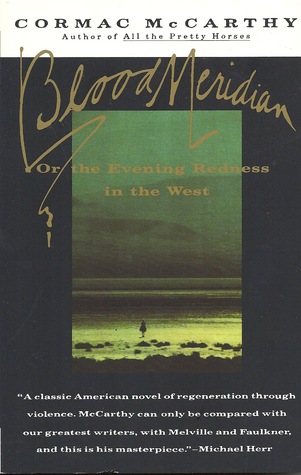Blood Meridian: Or the Evening Redness in the West
by Cormac McCarthy
Paperback, 337 pages
Published May 1992 by Vintage (first published April 28th 1985)
I made the early error of presuming I could read – and thereby review – this book by the same rules and standards of other fiction, but such conventions are meaningless to Cormac McCarthy. What he has created in Blood Meridian is something altogether distinct, and as such requires a different lens through which to examine it.
His characters, for example, are as scant as his punctuation, which is to say, by traditional standards they are distinctly minimalistic, even shallow. But of course, the traditional doesn’t apply here. The characters are no so much without depth as they are merely unknown, strangers, blank canvasses upon which McCarthy will paint their portraits for us, using only one color.
“Any man who could discover his own fate and elect therefore some opposite course could only come at last to that selfsame reckoning at the same appointed time…”
For Blood Meridian is a journey, one of inhuman, bestial, genocidal violence, in which the protagonist – the kid – is at first inured, then broken, until he is finally shaped and remade. Looking back at the scope of this odyssey, it is no wonder the kid we initially meet is as flat a character as he is – what possible significance could be attributed to a naïve 14-year-old boy, when compared to the man he becomes? McCarthy’s characters are thus the products of their journeys and experiences, revealed as the reader not only follows, but joins them on their brutal adventures.
Every character, that is, but one: the Judge.
The Judge is a force in Blood Meridian, a character of almost supernatural aspect in every ways; his stature, his appearance, his intelligence, his guile and his appetites. He looms larger and larger, and is eventually revealed as the kid’s unlooked-for guardian, his saviour, and ultimately, his doom. That the Judge is a devil-figure is undeniable, right down to his fiddle playing. But what then is McCarthy’s message in this blood-soaked narrative, if it is the devil who wins in the end?
McCarthy uses the setting of the American-Mexican borderlands as a surrogate for purgatory, a bleak, merciless land wherein men are drawn down into a state of anarchy. The question arises then, is this descent the result of man’s base nature, the devil’s nefarious influence, or both? That the Judge revels in such chaos is certain. War is the ultimate contest, blood the only ritual, and given free rein men will invariably pursue them both, with more of the same being the only reward. Needless to say, it is a grim outlook, with a strong leaning towards a philosophy of predestination, at least as expressed by the Judge himself. “The straight and the winding way are one” he says. “Any man who could discover his own fate and elect therefore some opposite course could only come at last to that selfsame reckoning at the same appointed time, for each man’s destiny is as large as the world he inhabits and contains within it all opposites as well.”
The philosophy of Blood Meridian flows far deeper than I am able to encompass at just one reading. For many readers the barriers of McCarthy’s capricious, often dream-like prose, his minimalistic use of punctuation, intentionally rambling, run-on sentences and above all his depictions of barbarous, gratuitous violence might preclude ever attempting this book, let alone finishing it, for which I would hold them faultless. It is a commentary on the darkest depths of the human soul, a topic which cannot be broached from the comforts of a Victorian sitting-room. McCarthy takes us, like Dante, through the Abyss; a journey which even his own characters cannot survive. No character but one, that is, for he himself is the architect of the madness.
– DGP